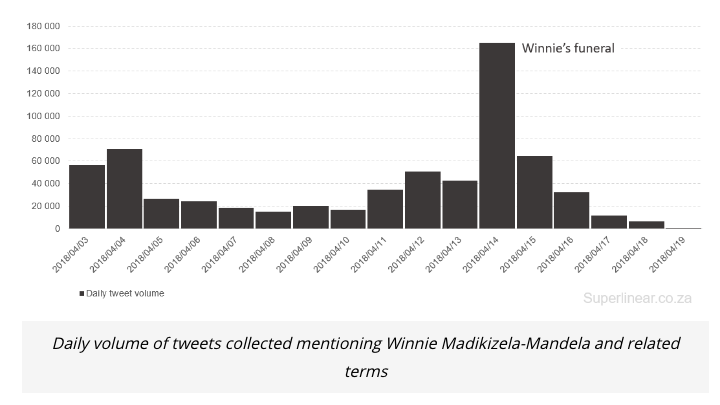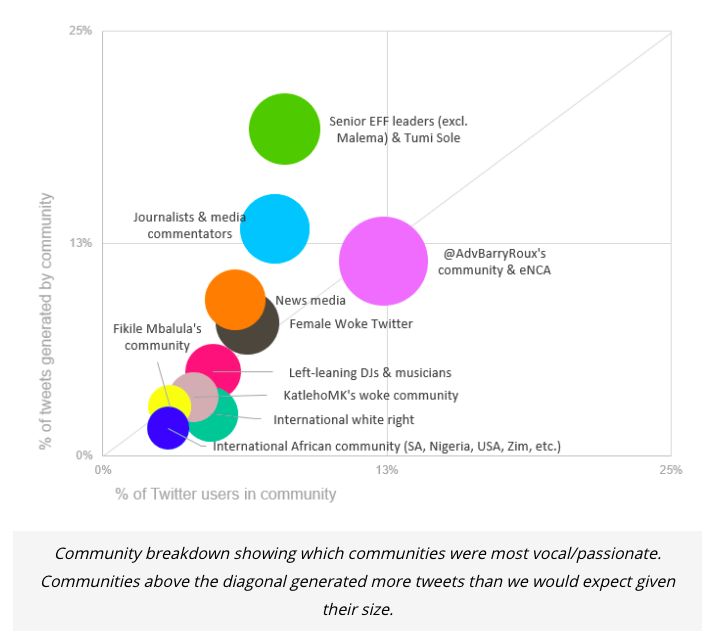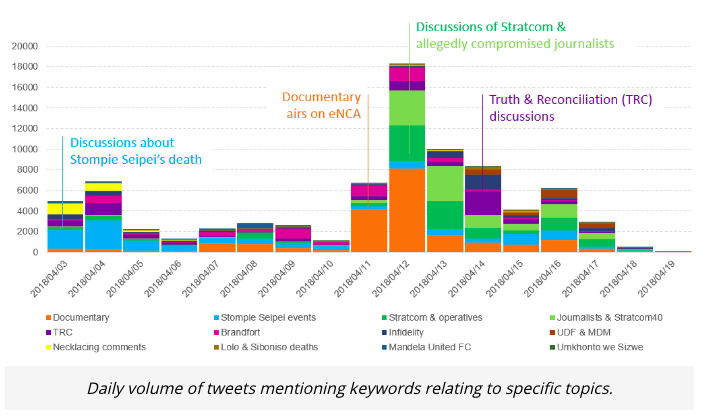Winnie Mandela – activist, freedom fighter, advocate for violent resistance, possible accessory to murder, mother, wife, philanthropist, iconoclast – died on the 2nd of April 2018. She left behind her a monumental but muddied legacy of fearless activism and fierce confrontation that spans the full arch of the Apartheid period, from the Rivonia Trial, to liberation in 1994, and the current post-liberation discontent. In some ways, her story mirrors those of many South Africans, and in other ways some of her choices appear completely alien to us. Few could know how they would behave in the situations she found herself in.
Her passing was a national event in South Africa. She was a particularly prominent voice and face of resistance when so many of her comrades had gone underground or left the country. Nowhere was her passing more vigorously marked than on Twitter where her conflicted legacy sparked a new wave of Winnie appreciation and condemnation. Social media is particularly good at taking multi-layered, nuanced topics and over-simplifying them. Thus, her complex life has been collapsed down into two opposing caricatures: that of the fiery, maternal “mother of the nation” and that of the angry, murderous embodiment of the swart gevaar. As ever with these things, the truth lies somewhere in between.
I tried to summarise the conflicted middle-ground in this earlier article about the evidence around that dark period in her life in Soweto in the late 1980s. Let’s see what the data tells us about what people on Twitter think about her though…
Almost 700 000 tweets
To investigate what people have been saying about her life, I collected 658 420 tweets by 204 538 unique Twitter users about Madikizela-Mandela since her passing. The conversation has gone through a few stages in the past few weeks: grief, revisiting of her ‘established’ legacy, and, after the release of the Winnie documentary (trailer), martyrdom and beatification.
Let’s start off by taking a look at how those discussions evolved. Below is a breakdown of the daily tweet volumes. Conversations peaked on the day of her funeral. Overall, it has persisted for a long period considering how quickly news is buried by the 24 hour news cycle these days:

Before we dive more deeply into the data, let’s take a look at which tweets resonated the most with Twitter users overall. Below are the five most retweeted tweets relating to Madikizela-Mandela. The EFF had a particularly close relationship with Madikizela-Mandela and their version of her life seems to have been accepted as the predominant interpretation in this data. Senior EFF party members were particularly close to her and so have a vested interest in her legacy. Julius Malema saw her as a role model and mother figure it seems, while Dali Mpofu is alleged to have had a romantic relationship with her in the late 80s (although Malema has disputed this in the past) which became a key component in the Stratcom narrative and, by all accounts, seems to have contributed greatly to her divorce from Nelson Mandela.
Which communities were talking?
Let’s now take a look at the different communities discussing Madikizela-Mandela’s passing and legacy. As usual, we use an interaction network to identify the main communities involved. This network is created by connecting Twitter users together when they interact with each other by retweeting or @mentioning each other. We then run a community detection algorithm on the resultant network to identify the different communities involved, which are each represented in a different colour below. And, the larger a user’s node is in the network, the more influential they are based on how often they’ve been retweeted and @mentioned (although I haven’t shown the names of individual users below). Here’s what almost 700 000 tweets by over 200 000 users look like:

The conversation was dominated by left-leaning communities. They mostly saw Madikizela-Mandela as a militant martyr who was not appreciated in her time and who was the victim of under-handed machinations, both by the apartheid government and by more moderate members of her own party, the ANC.
Of standout interest to me is the turquoise-green community at the bottom of the network map. The way that this community sits somewhat apart, but is connected to, the other communities involved is unusual. On further inspection, it turns out that this is actually the international white right-wing community. They had a separate conversation about Madikizela-Mandela that was somewhat tapped into the broader South African conversation.
An emerging trend in our country’s social discourse appears to be the merging of our local narratives, jargon and ideological arguments into the global zeitgeist. This is happening on both the left and the right.
An emerging trend in our country’s social discourse appears to be the merging of our local narratives, jargon and ideological arguments into the global zeitgeist. This is happening on both the left and the right.
The South African white right wing community is borrowing concepts such as a disdain for ‘SJWs‘ and ‘the left’, and a newly discovered zeal for free speech. In addition, they are allowing white farmer killings to become the latest poster-child for the global #WhiteGenocide meme. This meme was originally articulated by some who felt anxiety over majority-white Western countries potentially being “over-run” by immigrant populations, but has recently been re-purposed to refer to the plight of white Afrikaner farmers. While endearing the local white right with the global white right, this merging has not helped their case in popularising the issue more generally.
On the left, local arguments are predominantly articulated in terms of American identity politics. This is the prism through which most of the communities above interpret Madikizela-Mandela’s legacy (along with a pinch of Fanonism and Nkruma-style Pan Africanism).
Below is a breakdown of who was talking the most. Communities above the diagonal line generated more tweets than expected given how many users were in that community. This gives us an idea of who the really passionate communities were:

As it turns out, the most passionate community was also the largest. It was formed mostly around prominent EFF members, Floyd Shivambu, Mbuyiseni Ndlozi and Sentletse Diakanyo, as well as influencers such as @ali_naka and Tumi Sole.
The second most passionate community was anchored by journalists and media commentators such as Karyn Maughan, Ranjeni Munusamy, Sisonke Msimang and Andi Makinana. Interestingly, Patricia de Lille was also part of this community, but probably more because she was tweeted at than due to her own tweeting (de Lille attended the EFF’s memorial in Brandfort which caused a minor furore within her own party, the Democratic Alliance, which is currently trying to remove her as mayor of Cape Town).
Topics of conversation
Most of the conversation was adulation for Madikizela-Mandela. However, I tried to quantify the extent to which specific topics which have become inextricably intertwined with her legacy were discussed. In order to do so, I counted up the number of tweets that contained keywords relating to specific topics. The list of topics that I looked for is shown in the legend of the below chart. I’m aware that the topics that I looked for tend to focus on the most negative and controversial aspects of her life and misses out on her life before and after the time in Soweto in the 1980s. If anyone has any suggestions of any other specific events or topics to look for, please let me know via Facebook.

The first thing to note about the above chart is that these topics represent only about 10-12% of the tweets collected. The majority of tweets did not mention any of the topics shown in the chart so most discussions were likely not about these topics. Having said that, of the topics that I looked for, Stompie Seipei‘s death was the most prominent in the period after her death and before the Winnie documentary was aired on eNCA.
After the documentary was aired however, the conversation dramatically flipped to focus on the claims that the apartheid government’s Stratcom (Strategic Communications) unit worked with journalists to tarnish her reputation. These accusations manifested in two ways on Twitter: firstly, the Huffington Post published (and then retracted) a video clip wherein Madikizela-Mandela accused three journalists of working for the apartheid government, and secondly, former Stratcom head, Vic McPherson, claimed in the documentary to have had forty journalists on their pay-roll at the time, spawning the #Stratcom40 hashtag. These claims have been strenuously denied by those named and the South African National Editors Forum (SANEF) has asked that we treat these unsubstantiated claims with caution so we will have to see where things settle on this in time.
The data in the chart above captures an abrupt shift in public sentiment. It’s as if someone flipped a switch. Before the documentary was aired , her legacy was contested based on ‘facts’ established in the 1980s and 1990s media reports and TRC hearings. After the documentary was aired on eNCA (even though it’s been around since 2017), her legacy was turned inside out and she was recast as the pure archetype for the current ‘struggle’ and the ‘mother of the nation’.
Here are the top five tweets relating to the topics highlighted above:
The international white right weighs in
As I’ve already stated, we’re starting to see local debates framed in terms of international jargon and arguments more and more. Right-wing white South Africans see common cause with the US alt-right and similar groups across Europe while many left-leaning South Africans borrow from, and contribute to, discussions around race and gender framed in terms of American identity politics.
So just how was Winnie Madikizela-Mandela’s death co-opted by the international white right? Well, a few main themes emerge from the most popular tweets mentioning Madikizela-Mandela in this community:
A popular Swedish journalist used Madikizela-Mandela as an example of a communist in order to vilify the far left.
A scandal erupted around UK Labour MP, Naz Shah, who focused on Madikizela-Mandela’s infamous necklacing quote in a sincere farewell tweet.
Perceived double-standards in the reactions to whites and blacks were highlighted
…and so on.
Of course, we see the usual suspects behind these tweets, including Breitbart writers and men’s rights activists:
Summing it all up
So, in summary, what does this data show us?
Well for one thing, the volume of data is massive. We only usually generate this much buzz once or twice a year.
Secondly, the EFF and their reading of South African society and politics was the lens through which most of this conversation was interpreted. I would say that this data demonstrates that they continue to make ideological headway in our society, even if a loud noise on Twitter does not currently translate into more votes. It does point to the increasing radicalization of the urban, black middle class, which is where the EFF draws much of its support base from as far as I am aware though.
Thirdly, the story of Winnie Madikizela-Mandela’s life has been re-written in just a few days. If we weren’t uncertain of what to believe before, we now have even more narratives to take into account. Her life has become a cipher – all things to all people. Will we ever really know the truth and, if it is ever finally laid before us, will we even recognise it at this stage?
And, finally, South Africa finds itself increasingly a battlefield of an international ideological proxy war between the far right and the far left, threatening to polarise our own society in the same way that those sides have done in the rest of the Western world. We must re-discover the centre and we must resist telling our stories on other people’s terms and in other people’s words.
Kyle Findlay (@socialphysicist ) heads up a data science team for a large, international market research firm. This post originally appeared on his personal blog, Superlinear, and is republished here with the permission of the author.















